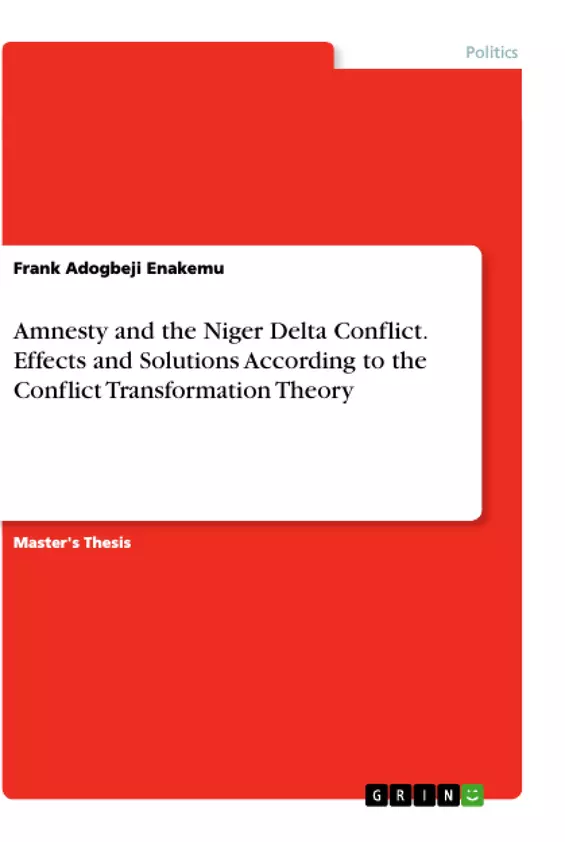The paper is about amnesty, the Niger delta conflict and the conceptual Framework like the concept of amnesty and the concept of disarmament, demobilisation and reintegration.
The research examined the impact of the Federal Government’s 2009 Amnesty programme for ex-militants in the Niger Delta. The focus was on security, and development in the region; it also focused on oil pipeline vandalism. The study made use of the Conflict Transformation theory. The central thesis of conflict transformation theory is that contemporary violent conflicts require interventions than transcend more than a mere change of position and the identification of win-win outcomes. The study utilized mainly qualitative methods – the Focus Group Discussion (FGD) and In-Depth Interviews (IDI). Secondary sources of data collection such as journals, articles, books government publication, internet articles and newspapers were also utilized; the data were descriptively analysed.
The sampling technique employed for the study was the purposive sampling to select the audience for the FGDs and IDIs. The findings revealed that the amnesty programme was able to address the security problem in the region to enable government to successfully carry out oil exploration and increase the nations earning from oil production. The findings also revealed that issues relating to governance and development in the region are still a fundamental problem in need of dire solutions.
The research recommends the following: The federal government should push for restructured Nigeria. The federal government should look into ways to improving on the present programme on Niger Delta; oil cooperation’s must be made to participate in providing basic amenities in the Region; the federal government must prioritize the clean –up of the region due to continuous oil spill and pollution in the environment.
Inhaltsverzeichnis (Table of Contents)
- CHAPTER ONE
- INTRODUCTION
- Background to the Study
- Statement of the Problem
- Aim and Objectives of the Study
- Research Questions
- Significance of the Study
- Scope of the Study/Delimitation
- Study Area
- CHAPTER TWO
- LITERATURE REVIEW
- Theoretical Framework
- Conceptual Framework
- CHAPTER THREE
- RESEARCH METHODOLOGY
- Research Design
- Population for the Study
- Sampling and Sampling Techniques
- Nature/Sources of Data
- Method of Data Collection/Instrumentation
- Method of Data Analysis
- Validity/Reliability of Research Instrument
- CHAPTER FOUR
- RESULTS AND DISCUSSION
- Presentation of Data
- Data Analysis
- Discussion of Findings
- CHAPTER FIVE
- SUMMARY, CONCLUSION AND RECOMMENDATIONS
- Summary
- Conclusion
- Recommendations
- Contributions to Knowledge
Zielsetzung und Themenschwerpunkte (Objectives and Key Themes)
This dissertation investigates the impact of the Federal Government's 2009 Amnesty program for ex-militants in the Niger Delta. The primary goal is to assess the program's effectiveness in addressing security issues, promoting development, and mitigating oil pipeline vandalism in the region. The study utilizes the Conflict Transformation theory, emphasizing interventions that transcend mere positional changes and aim for mutually beneficial outcomes.
- The impact of the Amnesty program on security in the Niger Delta.
- The role of the Amnesty program in facilitating development initiatives in the region.
- The efficacy of the Amnesty program in curbing oil pipeline vandalism.
- The broader implications of the Amnesty program for governance and development in the Niger Delta.
- The effectiveness of Conflict Transformation theory in addressing the complexities of the Niger Delta conflict.
Zusammenfassung der Kapitel (Chapter Summaries)
Chapter One provides an introduction to the study, setting the context for the Niger Delta's critical role in Nigeria's oil and gas industry. It highlights the region's resource wealth amidst significant poverty and underdevelopment. This chapter examines the historical context of oil exploration in the Niger Delta, tracing the conflict arising from environmental degradation and perceived inequitable resource distribution. The chapter delves into the socio-economic and political complexities of the region, highlighting the historical neglect and marginalization that have fueled unrest and militancy.
Chapter Two presents the theoretical framework underpinning the research, drawing upon Conflict Transformation theory to provide a comprehensive understanding of the Niger Delta conflict. This chapter analyzes various perspectives on the conflict and explores relevant literature on the relationship between resource extraction, environmental degradation, and societal unrest. The chapter then elaborates on the conceptual framework, outlining the specific concepts and variables that will be investigated.
Chapter Three outlines the research methodology employed in the study. This chapter discusses the research design, focusing on the qualitative methods employed: Focus Group Discussions (FGDs) and In-Depth Interviews (IDIs). The chapter explains the sampling technique, the data sources utilized, and the methods of data collection and analysis. It also addresses the validity and reliability of the research instruments.
Chapter Four presents the findings and analysis of the research. This chapter includes detailed information on the quantitative data collected through FGDs and IDIs, focusing on participant responses and perceptions regarding the Amnesty program's impact on security, development, and oil pipeline vandalism. The chapter also explores the challenges and opportunities associated with the Amnesty program, examining the program's effectiveness in addressing the root causes of the Niger Delta conflict.
Schlüsselwörter (Keywords)
This dissertation focuses on the critical themes of the Niger Delta conflict, particularly the impact of the Amnesty program on security, development, and oil pipeline vandalism. Key terms include conflict transformation, resource extraction, environmental degradation, socio-economic development, and governance in the Niger Delta region.
- Arbeit zitieren
- Frank Adogbeji Enakemu (Autor:in), 2021, Amnesty and the Niger Delta Conflict. Effects and Solutions According to the Conflict Transformation Theory, München, GRIN Verlag, https://www.grin.com/document/1015089



